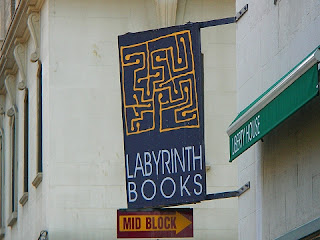I'm okay, you're okay! Wait, I'm great, and you're great too. We're all great and there's nothing to discuss except this totally abstract human problem plaguing general humankind for centuries, including famous people even! But absolutely not you. We will discuss this problem solely in the abstract, except where we might give some concrete suggestions, but only to fill out the picture.
Where reading self-help books has taken on a stigma, a new subgenre rises in the breach. Often it provides the historical sweeping view of a human problem, in addition to citing scientific studies, researchers and field experts It's not actionable nonfiction -- unless you want it to be.
I came up with the concept of the "someone-help" after finishing Daniel Akst's WE HAVE MET THE ENEMY: SELF-CONTROL IN THE AGE OF EXCESS. This was the latest in a string of books I had read, shelved under several different Dewey classifications, but all around the hazy idea of the sociopsychology of eating, diets and the food industry. (The ability to take a deep dive into a subject just because you have the resources available is one of my top five favorite things about reading, at least. I've been doing this at least since that stretch in the 2nd grade when I was obsessed with King Tut.) WE HAVE MET THE ENEMY isn't exclusively about self-control at the table, but there is that donut on the cover.
Beyond the subject of Akst's book, which I found interesting enough although by no means an exhaustive treatment of the topic, what hooked me into writing this post was the broad denial by Akst at the front of the book that he has any personal interest in the topic. He was so adamant that it was a bit creepy. It's not even an "I think we can all learn this," it's "I really don't have any of these problems, but here is a joke about how hard writing a book is if you have no self-control -- which obviously is not a problem for me." I'm paraphrasing, but this is a direct quote:
"For a writer in today's marketplace, moderation is an affliction... Although I check my e-mail a little too often, I am not addicted to anything. I do not even struggle with my weight, except -- and this is embarrassing -- when it gets too low. I've had my excesses over the years, but the sad fact is that I never quite manage to take them to excess... I will admit that in Las Vegas once, on assignment, I developed a gambling problem. The problem was that I lost $10 on the Penn-Dartmouth football game, the sting of which is with me still."
Poor Mr. Akst, having not one vice he can cop to to sell books. Never to know the glorious sloth of hitting the snooze button 4 to 6 times in one morning, or making dinner out of a box of Tagalongs! That's where my self-control problems lie, for I have done both those things and lived to tell the tale. That's how you relate. See? It's easy. (Though frankly I could use a Tagalong or two after writing this paragraph.)
The more I thought about it, though, Akst's demurral started to look like genius. It communicates to the reader that you and he are complicit in the problem you do not have. It compliments you -- you're too smart to have problems! -- instead of the classic coach method of breaking you down to build you back up. As long as you're learning, you can pretend that your problem is abstract, and that you're really perfect.

A true someone-help book contains three elements -- history, science and self-help. Another member of the genre, I've read recently, although ironically far less strident, is Gary Taubes' WHY WE GET FAT. (Answer: carbs.) This is primarily a scientific book with a few chapters at the end, not so much delivering practical tips on how to cut out all carbs (cauliflower crust pizza! Agave-based sweeteners! That ricotta cheese thing for dessert!) as stressing why it's absolutely necessary to do so if you want to live longer and healthier. I didn't agree with all of his points and found his sourcing a little specious at times, but he provided satisfying answers to some nutritional conundra, which is more than most authors can provide.
The lack of stridency is ironic because if you search for any reviews of the Taubes book you will run, sooner or later, into a wall of virulent comments about how wrong he is about everything, as one is tempted to state upon learning that an entire food group is to be eliminated. I knew this going in, so maybe it just didn't affect me as much. It's not necessarily the part of the author in this case to point out that carbs are delicious, but he could have acknowledged that this diet comes with its own difficulties.
Not every author wants to be part of the subject of his or her own actionable nonfiction book, and I understand that; nor would every author have experience with the topic about which s/he is writing. But there's something slippery about pretending everything's okay as a narrative tool. When the premise of your book is stacked on a false trust, there is a risk of erosion.

























